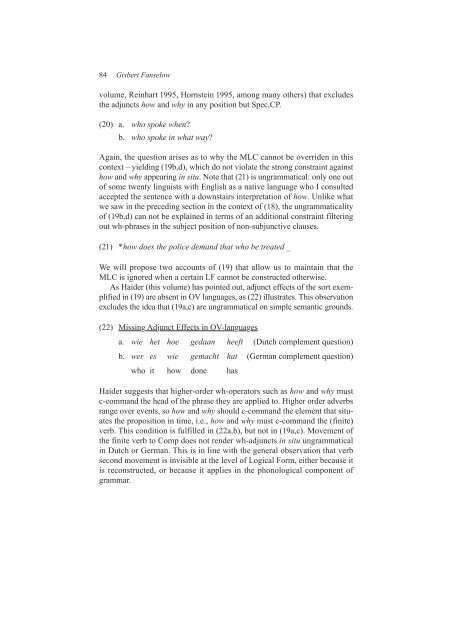Minimality Effects in Syntax · The MLC and Derivational Economy ...
Minimality Effects in Syntax · The MLC and Derivational Economy ...
Minimality Effects in Syntax · The MLC and Derivational Economy ...
You also want an ePaper? Increase the reach of your titles
YUMPU automatically turns print PDFs into web optimized ePapers that Google loves.
84 Gisbert Fanselow<br />
volume, Re<strong>in</strong>hart 1995, Hornste<strong>in</strong> 1995, among many others) that excludes<br />
the adjuncts how <strong>and</strong> why <strong>in</strong> any position but Spec,CP.<br />
(20) a. who spoke when?<br />
b. who spoke <strong>in</strong> what way?<br />
Aga<strong>in</strong>, the question arises as to why the <strong>MLC</strong> cannot be overriden <strong>in</strong> this<br />
context – yield<strong>in</strong>g (19b,d), which do not violate the strong constra<strong>in</strong>t aga<strong>in</strong>st<br />
how <strong>and</strong> why appear<strong>in</strong>g <strong>in</strong> situ. Note that (21) is ungrammatical: only one out<br />
of some twenty l<strong>in</strong>guists with English as a native language who I consulted<br />
accepted the sentence with a downstairs <strong>in</strong>terpretation of how. Unlike what<br />
we saw <strong>in</strong> the preced<strong>in</strong>g section <strong>in</strong> the context of (18), the ungrammaticality<br />
of (19b,d) can not be expla<strong>in</strong>ed <strong>in</strong> terms of an additional constra<strong>in</strong>t filter<strong>in</strong>g<br />
out wh-phrases <strong>in</strong> the subject position of non-subjunctive clauses.<br />
(21) *how does the police dem<strong>and</strong> that who be treated _<br />
We will propose two accounts of (19) that allow us to ma<strong>in</strong>ta<strong>in</strong> that the<br />
<strong>MLC</strong> is ignored when a certa<strong>in</strong> LF cannot be constructed otherwise.<br />
As Haider (this volume) has po<strong>in</strong>ted out, adjunct effects of the sort exemplified<br />
<strong>in</strong> (19) are absent <strong>in</strong> OV languages, as (22) illustrates. This observation<br />
excludes the idea that (19a,c) are ungrammatical on simple semantic grounds.<br />
(22) Miss<strong>in</strong>g Adjunct <strong>Effects</strong> <strong>in</strong> OV-languages<br />
a. wie het hoe gedaan heeft (Dutch complement question)<br />
b. wer es wie gemacht hat (German complement question)<br />
who it how done has<br />
Haider suggests that higher-order wh-operators such as how <strong>and</strong> why must<br />
c-comm<strong>and</strong> the head of the phrase they are applied to. Higher order adverbs<br />
range over events, so how <strong>and</strong> why should c-comm<strong>and</strong> the element that situates<br />
the proposition <strong>in</strong> time, i.e., how <strong>and</strong> why must c-comm<strong>and</strong> the (f<strong>in</strong>ite)<br />
verb. This condition is fulfilled <strong>in</strong> (22a,b), but not <strong>in</strong> (19a,c). Movement of<br />
the f<strong>in</strong>ite verb to Comp does not render wh-adjuncts <strong>in</strong> situ ungrammatical<br />
<strong>in</strong> Dutch or German. This is <strong>in</strong> l<strong>in</strong>e with the general observation that verb<br />
second movement is <strong>in</strong>visible at the level of Logical Form, either because it<br />
is reconstructed, or because it applies <strong>in</strong> the phonological component of<br />
grammar.
















